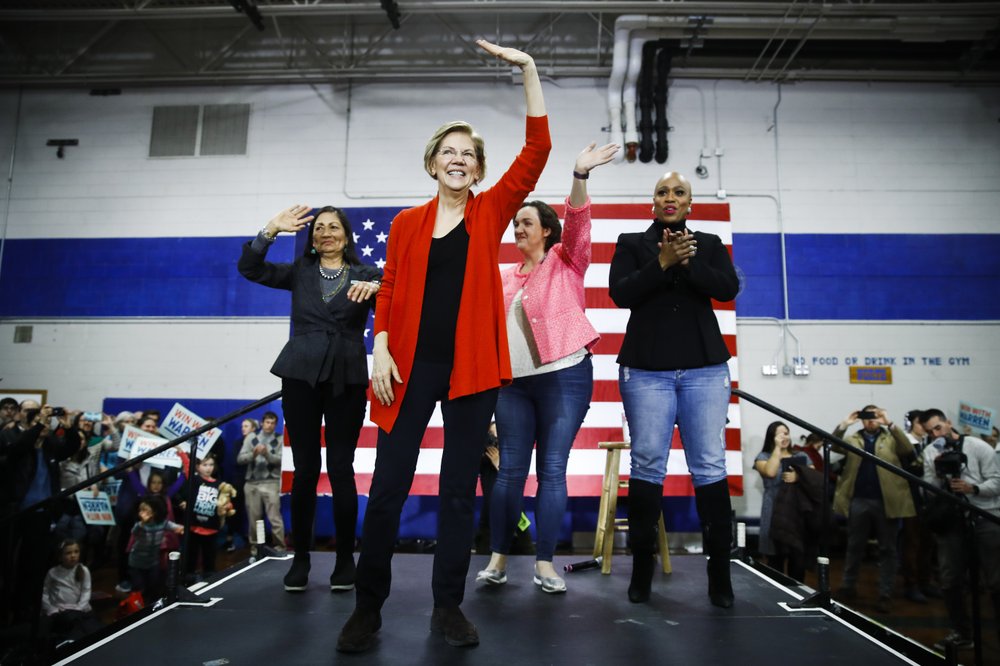Elizabeth Warren isn’t struggling like Joe Biden. But she isn’t soaring, like Pete Buttigieg and Bernie Sanders.
Instead, the Massachusetts senator enters a critical stretch of the campaign relegated to the murky middle. She has to convince voters she has a viable path to the nomination, even if that path is unclear. Her campaign has spent millions of dollars flexing organizational muscle throughout the country, but she’s lagging in her own backyard ahead of Tuesday’s New Hampshire primary.
“I think it’s going to be tough if she doesn’t do well,” said Neil Levesque, executive director of the New Hampshire Institute of Politics at Saint Anselm College.
Warren’s standing has frustrated her supporters and advisers, who have watched last summer’s surge stagnate as she has struggled to kick the campaign into a new political gear. They are also aware of the realities of her situation, including the fact that her fundraising has fallen off since she pulled in an impressive $24.6 million last summer.
Warren placed a respectable third in Iowa, behind Buttigieg and Sanders. But a similar finish in New Hampshire could put her candidacy in peril.
Expectations for her here had been high. Although Sanders won New Hampshire by more than 20 points during the Democratic primary campaign in 2016, Warren is also a familiar figure for the state’s voters. Her team has been touting the endorsements of nearly 700 New Hampshire elected officials, party elders, political activists and community leaders.
And if Warren doesn’t win in New Hampshire, it’s unclear where she might. Nevada goes next, then South Carolina and a slate of Southern states with high concentrations of African American Democrats, a demographic that polls suggest the senator has struggled to connect with.
Christina Reynolds, vice president of communications for Emily’s List, said much of the political world is willing to make concessions for Warren’s male counterparts that she herself doesn’t get.
“We’re willing to give Biden the benefit of the doubt. We’re willing to argue it’s OK for him not to win,” Reynolds said of Biden’s lackluster fourth-place finish in Iowa. “What is frustrating to me is there’s a special case here, there’s a special case there. How come the special case never applies to the women?”
The footnotes of presidential primary history are filled with candidates who rose, then fizzled, whose potential never translated into votes and victories. Some came back in later elections and found more success, like John McCain after his 2000 primary defeat and Hillary Clinton after her 2008 primary defeat. Others shelve their White House ambitions and move on to other endeavors.
Warren is hoping to avoid that fate.
She rose in the polls last summer by pitching herself as a relatable policy wonk, a candidate with a plan for everything. But she hit a roadblock when she rolled out a “Medicare for All” plan that pushed off implementation for three years, angering some liberals.
Warren’s campaign has tweaked its message in recent weeks, with the senator stressing her ability to unite the Democratic Party. She has also leaned into gender, noting that women have done better in elections since President Donald Trump won the White House in 2016.
Warren struggled, though, to push those messages before a national audience during Friday’s debate, her highest-profile opportunity to reach New Hampshire voters before the primary.
Instead, she went long stretches without speaking and sidestepped multiple opportunities to draw sharp contrasts with rivals. She appeared poised to take on Buttigieg, one of the front-runners out of Iowa, when asked by moderators if he had been held sufficiently accountable for the rise in arrests of black residents on marijuana possession charges while he was mayor of South Bend, Indiana.
“No. You have to own up to the facts,” she said, then quickly shifted to a recitation of her own criminal justice proposals.
By night’s end, Warren wound up getting four minutes less of talk time than Sanders, her chief progressive rival.
Campaigning Saturday in Manchester, Warren said she wished she’d had more time: “I had my hand up a lot.”
Warren is trying to make up for that lost time in the final days before New Hampshire votes, even traveling Sunday to the state’s remote northern region where Sanders’ support is thought to be the strongest. She had three stops planned for Monday, the final full day of campaigning.
And her campaign’s organizational strength has indeed been on display. Decked out in the campaign’s signature “liberty green,” hundreds of supporters packed a stadium in Manchester on Saturday night for a Democratic Party dinner.
Warren jogged onto the stage and proclaimed that she was ready to exceed expectations.
“There are a lot of people who talk about what races aren’t winnable or what kind of people can’t win,” Warren said. “The way I see it, they’re going to keep saying that right up until we get in the fight, we persist and we win.”
Theresa Davis, a 38-year-old who works in software services, drove two hours from Woodsville, New Hampshire, to see Warren on Sunday at a high school gymnasium in the state capital of Concord. Davis voted for Sanders in 2016 and may vote for him again. But she’s still considering Warren.
“I hope she stays in the race a while. Regardless of whether or not she wins, she is shaping some of the conversations that we need to have and that is important,” Davis said.
But she added: “I see Bernie having a clearer path forward, for sure.”
(AP)











